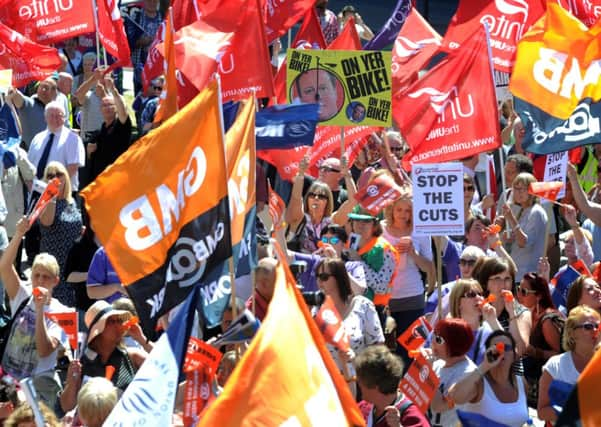Unions warning strikes will go into next year


Officials said they were “overwhelmed” by the strength of support for the walkout in disputes with the coalition over pay, pensions, jobs and spending cuts.
Rallies and marches took place in town and city centres across Yorkshire, including Hull, Leeds and Sheffield, as members of several public sector worker unions staged industrial action.
Advertisement
Hide AdAdvertisement
Hide AdMore than 750 schools across the county were closed or partially closed yesterday as a result of the action being carried out by the National Union of Teachers, Unite, Unison, GMB and the Fire Brigades’ Union
Caretakers, teaching assistants and other school staff took part in the action, alongside teachers.
Telephone callers to jobcentres were told in a recorded message that a limited service was available because of “service difficulties”.
Picket lines were mounted outside courts, council offices, jobcentres, fire stations and Parliament in outpourings of anger over the coalition’s public sector policies.
Advertisement
Hide AdAdvertisement
Hide AdAt a huge rally in central London, unions made it clear the action would continue into the New Year, stretching to the run-up to the general election.
The Government said fewer than half a million took part in today’s action, but the unions which organised the strike described the figure as “laughable”.
There was disruption to council services, museums and galleries, the fire service, courts, driving test centres, libraries and jobcentres.
The Prime Minister and other senior politicians attacked the strikes, arguing that they were based on ballots conducted some years ago which saw low turnout from union members.
Advertisement
Hide AdAdvertisement
Hide AdThe Conservatives are drawing up plans to change employment law so that a threshold of those balloted would have to be reached before industrial action could be held.
But Unite said no Tory Cabinet member achieved a 50 per cent voting threshold in the last general election.
General Secretary Len McCluskey said: “It is utter hypocrisy for the Government to talk about mandates for trade unions when not a single member of the present Cabinet would have been elected using the same criteria.
“The fact is not a single councillor in England has won 50 per cent of the electorate, not a single MEP has reached the 50 per cent threshold, Boris Johnson (London mayor) scraped in with just 37 per cent in 2008 and the Government’s flagship police and crime commissioner election gained a risible 17 per cent of the vote.”
Much of the dispute was centred on pay.
Advertisement
Hide AdAdvertisement
Hide AdA spokesman for the Local Government Association said: “With a £5.8bn funding shortfall to tackle over the next two years, budgets for local services will continue to be stretched for the foreseeable future.
“The offer we have made to increase most employees’ pay by one per cent is at the absolute limit of what local authorities can afford.”
Education Secretary Michael Gove said the NUT’s strike mandate was two years old and did not have the backing of the majority of the union’s members.
He said the walkout was imposing “significant costs on families who have to pay out for expensive childcare or give up a day’s work”.
Advertisement
Hide AdAdvertisement
Hide AdMr Gove also backed the idea of re-examining balloting laws, saying it was important that public services were protected and that any strike “reflects the interests of those in whose name it is taken”.